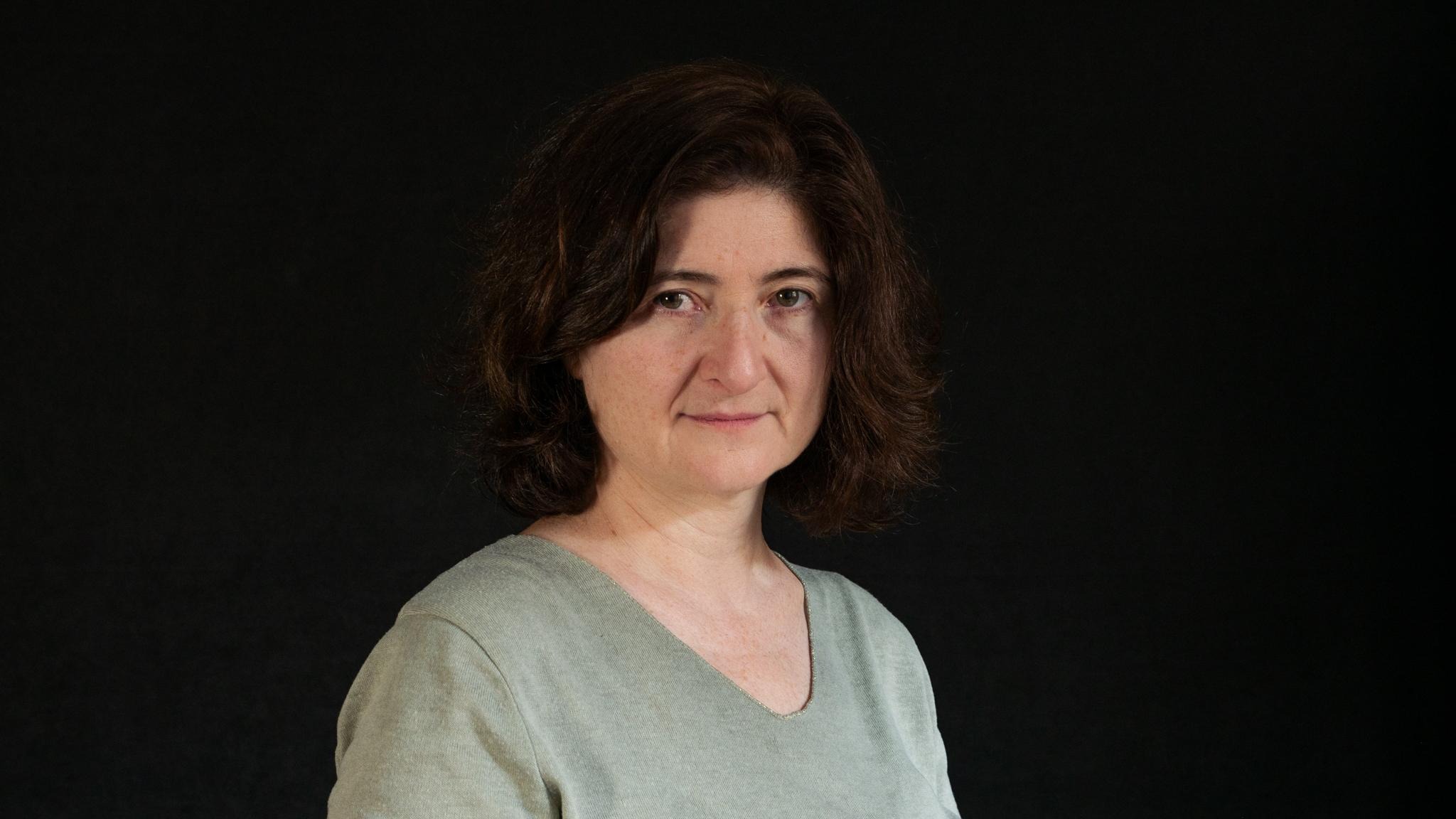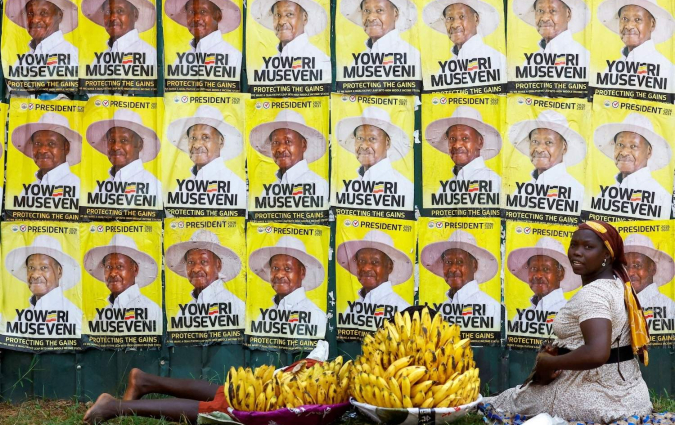Death threats and a dangerous law: How Georgian news media came under fire ahead of a critical election

Georgian investigative journalist Nino Zuriashvili.
In a late afternoon last May, Nino Zuriashvili received a call from an unknown Ukrainian number while working in the newsroom of Studio Monitor, the investigative outlet she founded along with four other colleagues in 2005.
On the other end of the line, she heard the voice of what sounded like a young man, immediately berating her in Georgian. Her colleague quickly recorded the conversation.
“This is a young boy,” Zuriashvili told me while sitting in her office in Tbilisi, Georgia in September while replaying the recording. “I asked him, ‘Why are you saying such words?’ And he said, ‘Because you are referring to the European Law of Transparency as the ‘Russian Law.’”
The piece of legislation this person was referring to is a controversial bill adopted by the ruling party in Georgia. The law would require media outlets or NGOs that receive 20% or more of their funding from foreign sources to register with the government as “foreign agents.”
The law is widely viewed by journalists, analysts and the EU as an attempt to stamp out critical media, and attracted huge street protests from mid-April to early June 2024, and also in 2023, when the party first unsuccessfully attempted to pass the law.
In substance, it is a close copy of the controversial foreign agents law adopted by Russia in 2012, giving rise to the “Russian law” nickname. But the bill’s official name is the Law of Transparency on Foreign Influence; the ruling Georgian Dream party argues the law is necessary to protect national sovereignty and is inherently European, a claim the European Commission rejects.
Zuriashvili is one of Georgia’s most prominent investigative journalists. So she felt that the call was yet another sign of the deepening crackdown on independent media in the country in the lead-up to this month’s parliamentary elections, which are scheduled for Saturday 26 October.
The elections are expected to be a watershed moment for Georgia’s future: marking either a sharp rebuke to the incumbent government and solidifying Georgia’s alignment with the West – or pushing the country back into Russia’s orbit. The odds of either outcome aren’t clear. The Georgian Dream party has faced huge street protests, but a wide range of opposition parties would have to unite in order to topple the party, which has been in power since 2012, and won the previous election with a narrow majority.
Phone calls, spray-paint and posters
Since 2000, Zuriashvili has been covering corruption among the country’s elite, first at the broadcaster Rustavi 2’s investigative programme 60 Minutes, named after the famous CBS News show in the United States.
In 2005, she and four other colleagues set up Studio Monitor with start-up money from the EU delegation and the British embassy. They had just left 60 Minutes over what they saw as political interference in their work.
Since their launch, Studio Monitor has published major investigations into corruption across the political system, and the journalists are no stranger to threats. Zuriashvili says she personally received death threats early on in her career.
But this time the calls were different. Zuriashvili began receiving them in large numbers, and she was not the only one. Her husband and sister also received them, as well as multiple other journalists at her outlet.
Three days after the first call from the Ukrainian number on 7 May, Zuriashvili found her car spray-painted with crude words and symbols and accusations that she was a “foreign agent.” The same words appeared on posters featuring her face which she found taped up outside her house and outside Studio Monitor’s Tbilisi newsroom.
Zuriashvili doesn't know exactly who ordered these attacks, but she says that complaints to the police went nowhere.
The harassment has been widespread across independent media. Journalist Lika Zakashvili, the editor-in-chief of the online outlet Publika, says photographs of her and her staff have appeared on social media, calling them traitors to the Georgian nation. Her 10-year-old daughter even came across one of these photos, she says.
A private phone conversation between her and Nino Zuriashvili also appears to have been recorded, Zakashvili says. Neither of the women knows how the conversation was recorded or leaked.
A law against journalism?
Both journalists say the intention is to use the law to repress critical media and freedom of speech. Most independent news organisations in the country receive funding from the EU, the US or foundations based in those regions. The law comes alongside another policy that would classify any coverage of LGBTQ+ rights as “propaganda.”
The law has been hugely controversial both inside and outside of Georgia. Georgian Dream already tried to approve it in 2023, but was forced to withdraw it after street protests and international pressure. In May, however, the party submitted the bill again, and used their parliamentary majority to override a veto from Georgia’s President, Salome Zourabichvili, who has been critical of the law. The President’s role is a largely ceremonial one.
Both Zourabichvili and the European Union have repeatedly warned that the law would endanger Georgia’s EU candidacy, which it received in 2023 after Russia’s full-scale invasion of Ukraine.
Polling from the US-based National Democratic Institute suggests nearly 80% of the Georgian public still favours further integration with Europe and NATO membership, a figure that is often cited within Georgia.
The foreign agents law represents one element of an apparent shift into Russia’s orbit. The shift is particularly marked because memories are still fresh of the Russian invasion in 2008, when Russian troops took control of the two breakaway regions of Abkhazia and South Ossetia. The Georgian government, the US and the EU say those regions, 20% of the country’s internationally recognised territory, are illegally occupied by Russia and Russian-proxies.
An oligarch against the EU
But comments by Bidzina Ivanishvili, the shadowy oligarch who is considered the guiding force behind the ruling Georgian Dream party, have gone even further, marking what appears to be a stark shift in political allegiance.
In April, Ivanishvili spread a vague conspiracy theory, what he called the “Global War Party”, which he alleged was influencing the EU and NATO, and enacting aggression on the country due to its failure to “turn Georgia into a second front” of the war.
He also alleged that the funding of NGOs by foreign governments was not aid but was being used to appoint outsiders to run the country and deprive Georgia of its sovereignty.
The speech also hinted at Georgian Dream’s attempt to criticise the EU even while acknowledging the Georgian public’s support for EU membership, by arguing with no evidence that the non-existent “Global War Party” was influencing the European Union into “destroying European values”.
If the ruling party wins this month’s elections,Prime Minister Irakli Kobakhidze has pledged to effectively ban pro-Western opposition parties, calling them “criminal political forces.” Journalists and analysts warn this move would effectively turn the country into a one-state autocracy and could represent a startling political shift for the Caucasus region as a whole.
“I can’t see what happens [after the election],” says Zuriashvili. “So the situation is very scary. They are threatening all NGOs, and they are threatening the opposition parties.”
Several organisations, including Studio Monitor and Publika, refused to register as “foreign agents” by 3 September, the deadline established in the law. As a result, they expected to pay a fee for refusing to register of 25,000 GEL, around $9,000; that will be followed by further, monthly fees. Both organisations say they would only pay the initial fee. As of 21 October, that fee had not been imposed.
“[Registering] is very hard for news organisations like ours because you’re a target,” says Zakashvili of Publika. “It gives the government a reason to monitor you. It’s a very repressive instrument.”
Registering entails not just being branded as a “foreign agent”, but handing over personal details about all your employees and giving the government complete oversight into reporting and sources, journalists say.
The Georgian government already has access to the outlet’s financial information, including salaries and funding, Zakashvili says. According to the law, if wrong information is submitted, the government has a right to monitor the work of the journalists every three months.
Both women say the shift in Georgian politics and the pressure on journalists has made their work even more difficult, and stress that the Georgian government hasn’t responded to their press queries for at least two years. Zuriashvili of Studio Monitor accidentally received an email from a government official confirming the refusal to speak to the outlet.
Sources across all walks of life are increasingly reluctant to speak or to be quoted on the record, both journalists say; Zakashvili adds that the pressure on critical media has sent a message to the rest of the population about the cost of speaking freely.
Georgian Dream did not respond to a request for comment for this piece.
'People are trying to stay quiet'
This pressure is part of a broader crackdown on free expression across Georgia, says Zakashvili, including in government departments and schools, which has encouraged a culture of self-censorship.
“People are trying to stay quiet,” she says. “They know that if they use their right to speak freely, the government or their boss can use this against them.”
For many older Georgians, the feeling is a familiar one. “We are a post-Soviet country, and people already know how it works,” she says.
The upcoming election looms large over Georgian media. Zakashvili says Publika will register as an official foreign news organisation in Georgia, which will in theory put it in the category of foreign correspondents rather than foreign “agents”, as a way to sidestep the restrictions of the law.
However, she’s doubtful the foreign agents law will be the final element of a crackdown on independent media. “I have no answer for what will happen with us,” she says. “After the election, everything is very unclear.”
In every email we send you'll find original reporting, evidence-based insights, online seminars and readings curated from 100s of sources - all in 5 minutes.
- Twice a week
- More than 20,000 people receive it
- Unsubscribe any time
signup block
In every email we send you'll find original reporting, evidence-based insights, online seminars and readings curated from 100s of sources - all in 5 minutes.
- Twice a week
- More than 20,000 people receive it
- Unsubscribe any time





